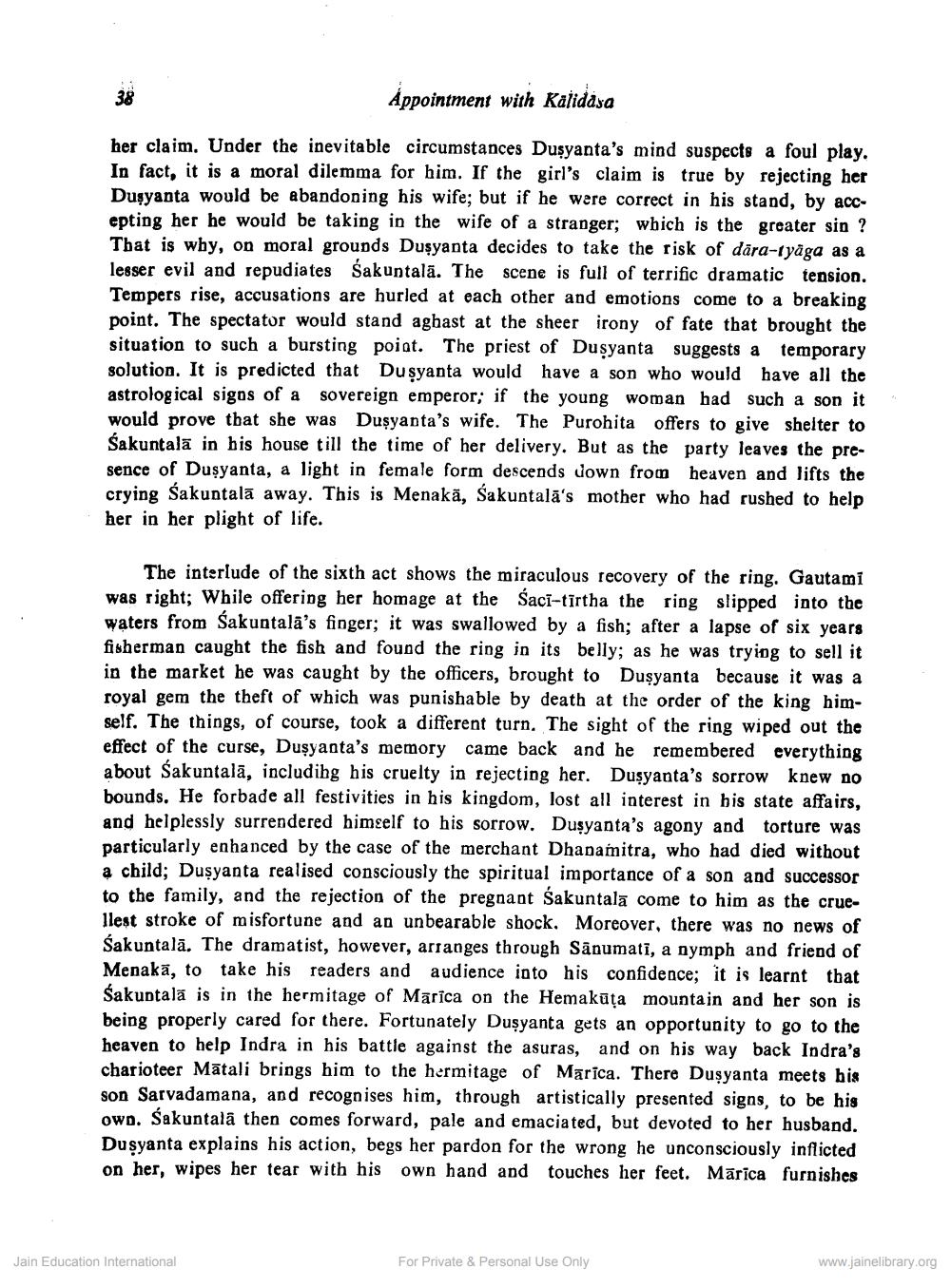________________
Appointment with Kalidasa
her claim. Under the inevitable circumstances Dusyanta's mind suspects a foul play, In fact, it is a moral dilemma for him. If the girl's claim is true by rejecting her Duşyanta would be abandoning his wife; but if he were correct in his stand, by accepting her he would be taking in the wife of a stranger; which is the greater sin ? That is why, on moral grounds Duşyanta decides to take the risk of dāra-tyaga as a lesser evil and repudiates Sakuntalā. The scene is full of terrific dramatic tension. Tempers rise, accusations are hurled at each other and emotions come to a breaking point. The spectator would stand aghast at the sheer irony of fate that brought the situation to such a bursting point. The priest of Duşyanta suggests a temporary solution. It is predicted that Dusyanta would have a son who would have all the astrological signs of a sovereign emperor; if the young woman had such a son it would prove that she was Duşyanta's wife. The Purohita offers to give shelter to Śakuntala in his house till the time of her delivery. But as the party leaves the presence of Duşyanta, a light in female form descends down from heaven and Jifts the crying sakuntalā away. This is Menakā, Sakuntalā's mother who had rushed to help her in her plight of life.
The interlude of the sixth act shows the miraculous recovery of the ring. Gautami was right; While offering her homage at the Saci-tīrtha the ring slipped into the waters from Sakuntalā's finger; it was swallowed by a fish; after a lapse of six years fisherman caught the fish and found the ring in its belly; as he was trying to sell it in the market he was caught by the officers, brought to Duşyanta because it was a royal gem the theft of which was punishable by death at the order of the king himself. The things, of course, took a different turn. The sight of the ring wiped out the effect of the curse, Duşyanta's memory came back and he remembered everything about Sakuntalā, including his cruelty in rejecting her. Duşyanta's sorrow knew no bounds. He forbade all festivities in his kingdom, lost all interest in his state affairs, and helplessly surrendered himself to his sorrow. Duşyanta's agony and torture was particularly enhanced by the case of the merchant Dhanamitra, who had died without a child; Duşyanta realised consciously the spiritual importance of a son and successor to the family, and the rejection of the pregnant Sakuntala come to him as the cruellest stroke of misfortune and an unbearable shock. Moreover, there was no news of Śakuntalā. The dramatist, however, arranges through Sānumatī, a nymph and friend of Menakā, to take his readers and audience into his confidence; it is learnt that Śakuntală is in the hermitage of Mārica on the Hemakūta mountain and her son is being properly cared for there. Fortunately Duşyanta gets an opportunity to go to the heaven to help Indra in his battle against the asuras, and on his way back Indra's charioteer Mātali brings him to the hermitage of Marica. There Duşyanta meets his son Sarvadamana, and recognises him, through artistically presented signs, to be his owo. Śakuntala then comes forward, pale and emaciated, but devoted to her husband. Dusyanta explains his action, begs her pardon for the wrong he unconsciously inflicted on her, wipes her tear with his own hand and touches her feet. Mārica furnishes
Jain Education International
For Private & Personal Use Only
www.jainelibrary.org




